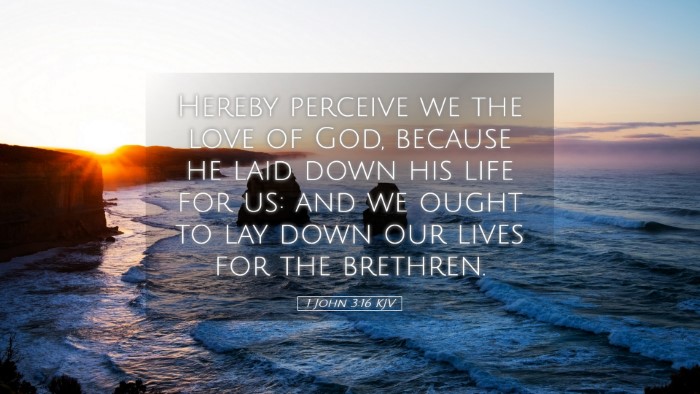Old Testament
Genesis Exodus Leviticus Numbers Deuteronomy Joshua Judges Ruth 1 Samuel 2 Samuel 1 Kings 2 Kings 1 Chronicles 2 Chronicles Ezra Nehemiah Esther Job Psalms Proverbs Ecclesiastes Song of Solomon Isaiah Jeremiah Lamentations Ezekiel Daniel Hosea Joel Amos Obadiah Jonah Micah Nahum Habakkuk Zephaniah Haggai Zechariah Malachi1 John 3:16
1 John 3:16 KJV
Hereby perceive we the love of God, because he laid down his life for us: and we ought to lay down our lives for the brethren.
1 John 3:16 Bible Commentary
Commentary on 1 John 3:16
Verse: "Hereby perceive we the love of God, because he laid down his life for us: and we ought to lay down our lives for the brethren."
Introduction
This verse serves as a pivotal point in the epistle of 1 John, encapsulating the essence of Christian love as modeled by Christ. The profound implications of Christ’s sacrificial love and the call for believers to emulate that love form a thematic cornerstone in Christian theology.
Historical Context
The apostle John writes this epistle to counter false teachings and to reinforce the foundation of authentic Christian doctrine. The community faced challenges related to love, sin, and the practical outworking of faith in daily life. Understanding the context enhances the application of the verse, as it was directed toward a community that needed assurance of their faith and identity in Christ.
Exegesis of the Verse
John begins the verse with "Hereby perceive we the love of God," which indicates a clear recognition or understanding of God’s love, grounded not in mere intellectualism but in demonstrative action. There is a strong emphasis on the tangible nature of love as displayed through the life and death of Jesus Christ.
Christ's Sacrificial Love
- Laid Down His Life: The phrase “laid down his life for us” underscores the intentional sacrifice Jesus made. The imagery suggests not just death, but a voluntary giving, portraying love as selfless action rather than mere sentiment.
- Implication of Covenant Love: This act fulfills the definition of agape love—an unconditional, sacrificing love that seeks the best for others irrespective of their response or worthiness.
- Historical Parallels: Matthew Henry notes that laying down one’s life is a mark of the truest friendship (John 15:13), establishing a model that goes beyond mere verbal affection to an actionable commitment to others.
Call to Action
Following the recognition of Christ’s love, John states a profound obligation: “we ought to lay down our lives for the brethren.” This dictate creates a direct link between understanding divine love and manifesting it in our relationships with others. The use of “ought” implies not only moral responsibility but also spiritual necessity.
Interpretive Insights
- Albert Barnes emphasizes that this kind of love should be reflected in our willingness to bear one another’s burdens, endure hardships for one another, and prioritize others’ well-being.
- Adam Clarke contributes that true Christian discipleship involves a readiness to give oneself for the sake of others, indicating that sacrifice is not limited to martyrdom, but can also manifest in our daily choices and actions.
Theological Implications
This verse is rich with theological significance, focusing on the nature of God as love and the implications for the believer’s lifestyle:
1. Understanding God's Love
1 John 3:16 reveals not only what love is but also who God is. God is defined by His sacrificial love. This informs all Christian interactions and the believer's identity.
2. The Nature of Christian Community
The exhortation to lay down our lives for one another binds the community of believers. The church is called to operate on principles of mutual love, support, and sacrifice; a reflection of the interconnectedness expected in the body of Christ.
3. Ethical Living
The ethical implications of this verse challenge believers to rethink their personal agendas and comfort zones. Love that mirrors Christ's sacrifice often requires us to step out of our convenience for the sake of others’ needs.
Practical Applications
As we reflect on the rich insights of this verse, several practical applications emerge for the church and individual believers:
- Self-Sacrifice in Service: Encourage believers to engage in acts of service that may require personal sacrifice. This could be through volunteering, helping those in need, or advocating for the marginalized.
- Cultivating Community: Foster environments in churches where love is practiced through communal support and accountability. This could involve small groups that focus explicitly on caring for one another’s spiritual and physical needs.
- Preaching and Teaching: Pastors and leaders should emphasize the centrality of Christ’s love in sermons and teaching, drawing parallels between Christ’s sacrifice and the ongoing mission of the church.
Conclusion
1 John 3:16 serves as a profound exhortation for believers to recognize and emulate the sacrificial love of Christ in their lives. The historical context and theological implications underscore a call to action that is rooted in the essence of Christian faith. This verse is not merely a statement of doctrine, but a transformative directive that compels believers to live out their faith through love in a tangible way.


